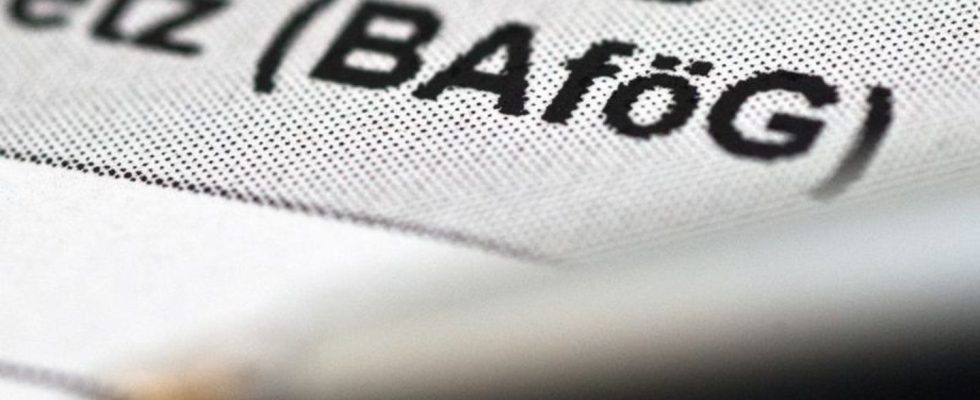Federal Cabinet
Bafög reform: 1000 euros for needy new students
The Bafög rates were last increased for the winter semester 2022/2023. photo
© Andrea Warnecke/dpa
Not only those who can afford it should study. With start-up capital at the start of their studies, Ampel also wants to encourage children from low-income families to take up studies.
Beginning in the fall, first-year students from poorer families will receive 1,000 euros in starting money from the state to purchase a laptop, textbooks or to finance the move to the place of study. The so-called study start aid is part of a Bafög reform that Federal Cabinet has initiated.
“Studying should not depend on the parents’ wallet,” said Federal Education Minister Bettina Stark-Watzinger (FDP) after the decision in Berlin. The law is now being discussed further in the Bundestag, so details may still change.
According to the draft, the actual Bafög rates will not be increased. This is met with a lot of criticism because life has become more and more expensive in recent years. The regulations of the planned reform at a glance:
Around 15,000 new students could benefit every year
The 1,000 euro study start aid should go to new students who are under 25 years old and who, for example, receive citizen’s benefit or live in families who need to supplement their income through other state benefits such as child allowance or housing benefit. The Federal Ministry of Education roughly estimates in its draft law that around 15,000 first-year students could benefit every year. Last year there were almost 480,000 first-year students at German universities.
Applications should be possible for the next winter semester. The contact point will probably be the “Bafög Digital” portal, where Bafög can also be applied for online. According to current plans, uploading proof of receipt of the mentioned social benefits and a copy of the enrollment certificate should be sufficient. The 1,000 euros do not have to be repaid and are not counted as income for other benefits, including BaföG.
The Bafög itself will not increase if the draft law from the FDP-led Ministry of Education is anything to go by. Trade unions, social associations, student representatives and the opposition once again sharply criticized this with regard to the increased cost of living. Coalition politicians from the SPD and the Greens are also pushing for adjustments to be made here.
Further surcharges possible
The Bafög was last increased by 5.75 percent for the winter semester of 2022/23. Anyone who is studying and still lives with their parents can receive 511 euros per month – this includes a so-called basic need of 452 euros plus 59 euros for housing. Away from home it is 452 plus 360 euros for accommodation. Further surcharges for health and nursing care insurance are also possible if students are no longer insured by their parents, so that a maximum rate of 934 euros can be reached.
Since assets, your own income, and the income of your parents and spouses are taken into account, the actual Bafög amount is always individual. This is where the next point of the reform comes in: an increase in the allowances that apply to the credit. They should be increased by five percent in order to expand the number of Bafög recipients. Background: Their number has fallen significantly in recent years. According to the Federal Statistical Office, 630,000 people received Bafög benefits in 2022, compared to 979,000 ten years earlier. Higher allowances mean that parents and Bafög recipients will be able to earn more in the future and will still not immediately lose out on Bafög funding.
Always reforms
The Federal Training Assistance Act (Bafög) has been reformed repeatedly since its introduction in 1971 – colloquially, the name of the law now stands for the actual cash benefit. What was initially a pure grant without repayment later became a full loan. But the rule has been in effect since 1990: one half is given as a gift, the other half has to be paid back. There is now a little more pressure on the repayment, which is due around five years after graduation and can take a maximum of 20 years. The reform stipulates that in the future at least 150 euros instead of the current 130 euros must be repaid per month. The rates would be adjusted to “current income and price developments,” according to the justification for the draft law.
The current Bafög reform also provides for the introduction of a so-called flexibility semester. If time is running out at the end of your studies and the final thesis is difficult, those affected should be able to receive Bafög funding for six months longer, even if the end of the standard period of study has already been reached. It should also become easier to change your field of study without jeopardizing your Bafög entitlement.
Criticism comes from many quarters
The Education and Science Union (GEW) called on the Bundestag to thoroughly revise the draft law and accused the government of fobbing off students with a zero round. The co-chairman of the Joint Science Conference of the Federal States, Bavaria’s Science Minister Markus Blume (CSU), said that the cabinet decision completely ignores the reality of students’ lives. The current benefits are still below the citizen’s allowance and are completely inadequate, criticized the general manager of the Joint Association, Ulrich Schneider.
The FDP-led Ministry of Education is also receiving pressure from coalition politicians. The deputy SPD parliamentary group leader Sönke Rix told the German Press Agency that the law would be renegotiated hard in the Bundestag and that “significant adjustments” would be needed in the requirement rates and housing costs. Education Minister Stark-Watzinger defended the plans and referred to those that had already taken place Increase a year and a half ago. The rates have been adjusted significantly there. Their level will continue to be checked regularly.

